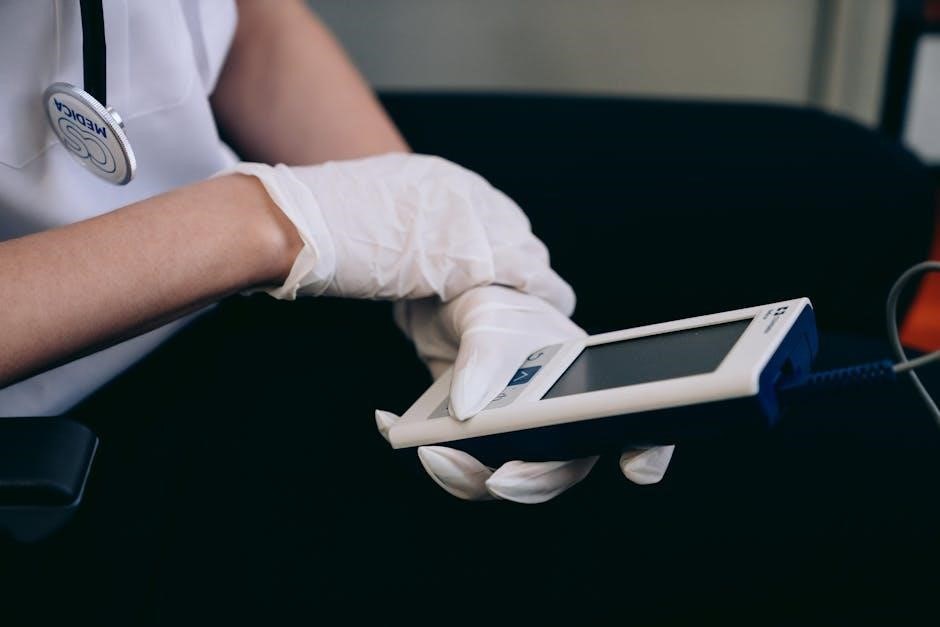The Nursing Assistant Exam is a critical certification step for aspiring healthcare professionals. It assesses both theoretical knowledge and practical skills, ensuring competency in patient care.
1.1 Importance of the CNA Exam for Aspiring Nursing Assistants

The CNA exam is a pivotal step for individuals seeking a career in healthcare. It validates their knowledge and skills, ensuring they meet industry standards. Passing the exam not only enhances job prospects but also demonstrates a commitment to patient care. It equips aspiring nursing assistants with the confidence and credibility needed to excel in their roles. Additionally, the exam emphasizes adherence to safety protocols and ethical practices, which are crucial in healthcare settings. By succeeding, candidates prove their readiness to contribute effectively to patient well-being and professional teams. Thus, the CNA exam is essential for launching a successful and fulfilling career in nursing assistance.

Overview of the Nursing Assistant Exam
The Nursing Assistant Exam evaluates both written knowledge and clinical skills, ensuring candidates are prepared for real-world patient care scenarios. It consists of 75 questions and a clinical section.
2.1 Exam Structure and Content Breakdown
The Nursing Assistant Exam is divided into two main sections: a written knowledge test and a clinical skills evaluation. The written portion contains 75 multiple-choice questions, covering topics such as patient care, infection control, and legal aspects of healthcare. The clinical section requires candidates to demonstrate proficiency in five randomly selected nursing skills, such as vital sign measurement, catheter care, or wound dressing. Each section is designed to assess both theoretical understanding and practical application. Candidates must pass both parts to earn certification. The exam is timed, with up to two hours allowed for completion. This structured format ensures that nursing assistants are well-prepared to provide safe and effective patient care in real-world settings.
2.2 Understanding the Written and Clinical Skills Sections
The Nursing Assistant Exam consists of two distinct sections: the written knowledge test and the clinical skills evaluation. The written portion includes 75 multiple-choice questions that assess a candidate’s understanding of nursing concepts, patient care procedures, and safety protocols. Topics covered range from infection control to residents’ rights. The clinical skills section evaluates practical abilities through hands-on demonstrations of nursing tasks, such as measuring vital signs, transferring patients, or performing wound care. Candidates are required to complete five randomly selected skills, showcasing their competence in real-world scenarios. Both sections are essential for ensuring that nursing assistants possess the knowledge and skills necessary to provide high-quality patient care safely and effectively.
Sample Questions and Answers
The CNA exam includes 75 multiple-choice questions and 5 clinical skills. Topics range from infection control to patient transfers, ensuring comprehensive assessment of nursing assistant competencies.
3.1 Clinical Scenarios and Effective Responses
Clinical scenarios on the CNA exam simulate real-life patient care situations, testing practical skills. For example, if a client begins to choke during dinner, the nurse aide should immediately encourage coughing and, if unsuccessful, perform the abdominal thrust maneuver. Another scenario involves a client experiencing a seizure, where the aide should ensure safety, turn the client onto their side, and remain with them until recovery. Effective responses demonstrate adherence to safety protocols and empathy; Candidates are expected to think critically and prioritize patient well-being. These questions evaluate the ability to apply training in high-pressure situations, ensuring competence in emergency care. Practicing these scenarios enhances confidence and readiness for the exam.
3.2 Time Management Strategies for the Exam
Effective time management is crucial for success on the Nursing Assistant Exam. With 75 questions and a 2-hour time limit, candidates must allocate their time wisely; Allocate 1-2 minutes per question, prioritizing easier questions first to secure initial points. Skip challenging questions initially but mark them for later review. Practice with timed sample tests to simulate exam conditions and improve pacing. Avoid spending too long on a single question, as it may compromise the ability to answer others. Use the process of elimination to narrow down choices if unsure. Stay calm and focused to maintain efficiency. By balancing speed and accuracy, candidates can effectively manage their time and maximize their score.

Tips for Success in the Nursing Assistant Exam
Thorough preparation and understanding the exam format are essential. Utilize study guides, practice with sample questions, and stay calm and focused during the exam.
4.1 Study Techniques and Preparation Methods
A well-structured study plan is essential for success. Utilize certified study guides and practice exams to familiarize yourself with the exam format. Focus on understanding clinical scenarios and effective responses. Dedicate time to review key topics such as patient care, infection control, and medical terminology. Active learning techniques, like creating flashcards or participating in study groups, can enhance retention. Prioritize mastering clinical skills by practicing mock exams and seeking feedback. Allocate specific time slots for each section of the exam to improve time management. Stay updated with the latest resources, such as the Nursing Assistant Exam Questions and Answers PDF, to access real-world examples. Regular practice and consistent review will build confidence and readiness for the exam.

Common Interview Questions for Nursing Assistants
Common questions include scenarios on patient care, conflict resolution, and ethical dilemmas. Be prepared to discuss your experiences and how you handle challenging situations effectively.
5.1 Frequently Asked Questions and Model Answers
During interviews, candidates often face questions about clinical scenarios, such as handling a client who starts choking or resolving grievances. For instance, when asked, “What would you do if a client begins to choke?” a model response might be, “I would immediately call for help, ensure the client’s airway is clear, and perform the Heimlich maneuver if necessary.” Another common question is, “How would you handle a sparking electric shaver while shaving a client?” The appropriate answer would involve prioritizing safety, turning off the device, and notifying a supervisor. These questions assess problem-solving skills and knowledge of proper protocols. Practicing these responses is essential for confidence and clarity during interviews. Understanding common scenarios and their solutions helps candidates demonstrate their readiness for real-world challenges.
The Role of Study Guides in Preparation
Study guides provide structured content, sample questions, and practical tips, helping candidates understand exam formats and improve problem-solving skills for the Nursing Assistant Exam.
6.1 Recommended Resources for Effective Study
Several resources are available to aid in preparing for the Nursing Assistant Exam. Study guides like the CNA Exam Preparation Guide offer comprehensive practice questions and detailed explanations. Additionally, Florida Training Academy provides video tutorials and mock exams to simulate real test conditions. Websites offering free PDF downloads, such as nursing assistant interview questions and answers pdf, are invaluable for reviewing common exam topics. These resources cover clinical scenarios, time management tips, and essential skills assessment. Utilizing these tools ensures a well-rounded preparation strategy, helping candidates feel confident and ready for both the written and clinical sections of the exam.
Preparing for the Nursing Assistant Exam requires dedication and effective resources. Utilizing study guides and practice questions ensures confidence and readiness for both written and clinical sections. Success in the exam opens doors to a fulfilling career in healthcare, making thorough preparation essential for aspiring nursing assistants.
7.1 Final Thoughts on Preparing for the Exam
Mastering the Nursing Assistant Exam demands a strategic approach. Prioritize understanding core concepts over mere memorization, as this enhances problem-solving abilities. Allocate time for both theoretical study and hands-on practice. Utilize reliable study guides and practice exams to familiarize yourself with the test format. Focus on weak areas identified through self-assessment. Stay calm and manage time effectively during the exam to ensure optimal performance. Remember, consistent effort and a well-structured study plan are key to achieving success. By adhering to these strategies, aspiring nursing assistants can confidently approach the exam and secure their certification, paving the way for a rewarding career in healthcare.
